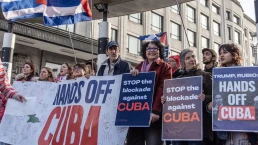When NATO celebrates 75 years of itself in Washington D.C. in July, some of us will be saying No to NATO and Yes to Peace, without joining either side of the commonly understood debate.
By David Swanson, World BEYOND War
How can media outlets be taken seriously — and I do not mean this rhetorically — when they shout that two hostages have been freed while adding in the fine print that several dozen mere Palestinians have been killed in the process, when they propose that a city of starving refugees be bombed in a manner that “protects civilians,” when they equate fueling wars with “aid”?

One part of the answer is that they feature raging debates between wildly opposed positions. Surely only open and free media would allow that! Typically, they have to do this in all the small-budget (that is, non-military) policy areas. Trump’s gift to corporate propaganda is the inclusion of foreign policy among the areas of debate. But, just as with most of the other debates, the key characteristic of the foreign policy debates is that both sides firmly agree on all the basic points and get them all dead wrong.
“Arm Taiwan to build up to a war on China right now” is opposed by the demand to arm Taiwan to build up to a war on China right now.
“Militarize the border of Mexico right now” is opposed by the demand to militarize the border of Mexico a bit later. Big debate!
“Rush more free weapons to the genocide in Gaza” is opposed by the demand to rush more free weapons to the genocide in Gaza. Except that the fierce opposition of the majority of the U.S. public starts to leak through here and there. It becomes necessary to move the focus to Biden’s age, or even to talk of demanding a ceasefire while providing the weapons, or at the far extreme to discuss redundantly banning weapons shipments that already violate more laws than a Trump bank account. Debate rages!
The really big debate, however, is on the topic of Ukraine and NATO. One side (Trump and whoever tries to make sense of his logorrhea) maintains that militarism is a public service that every nation should invest in for the good of the world and to the extent of that nation’s financial ability, that arms build-ups never provoke wars but only prevent them, that the Russian invasion of Ukraine resulted from insufficient Western militarism, and that there is no path to a better world that involves the rule of law, diplomacy, conflict management, disarmament, unarmed civilian defense, the inclusion of Russia in NATO, or the abolition of NATO. This is countered by the other side (virtually every corporate commentator) which maintains the exact same thing on every point.
So where’s the debate? While Trump evicted Russian diplomats, sanctioned Russian officials, put missiles practically on Russia’s border, sent weapons into Ukraine that Obama refused to send because it could lead to war with Russia, lobbied European nations to drop Russian energy deals, left the Iran agreement, tore up the INF Treaty, rejected Russia’s offers on banning weapons in space and banning cyberwar, expanded NATO eastward, added a NATO partner in Colombia, proposed adding Brazil, demanded and successfully moved most NATO members to buy significantly more weapons, splurged on more nukes, bombed Russians in Syria, oversaw the largest war rehearsals in Europe in half a century (now outdone), condemned all proposals for a European military, and insisted that Europe stick with NATO — all of which is considered decent and respectable, so best not to talk about, Trump also says things like that he would encourage Russia to do whatever it wants to countries that have not paid the money they owe NATO.
The debate is not over Trump’s notion of using war as the answer to all problems, but over his suggestion that Russia wage wars. That is almost the very worst thing that could ever be said, in the view of many, including — but by no means limited to — many of the same people for whom “This genocide is all right” used to be one of the very worst things that could ever be said.
As it’s our civic duty to ignore Biden’s mental blunders, according to three — count them — op-eds in Tuesday’s New York Times, I think we should also ignore, or at least not completely obsess over, the fact that Trump has no idea how NATO works, that dues paid into NATO are small and all paid, and that what he’s actually talking about is the notion that each nation should spend at least 2% of its “economy” on weapons (mostly U.S. weapons, so that Trump can brag about the sales in front of cameras, as other presidents brag behind closed doors).
Of course on the debate over whether one should encourage Russia to wage wars, the Trump side is dead wrong and the other side dead right. But the reason for that is not, as Biden says, that a commitment to NATO is “sacred” or that Trump is being “un-American.” Trump is of course being more “American” by threatening anybody else with war in the name of saving U.S. dollars. And commitments to military alliances are not “sacred.” Trump is wrong to suggest encouraging wars because war is an evil, mass-murderous enterprise.
The “NATO is a sacred commitment” crowd is of course also threatening war. The commitment in joining NATO is not to say nice things about Europe or to hate Russia or to sanction Russia or to pretend Trump never sanctioned Russia, or to buy weapons, or to pay dues. The commitment is to join in any war that any other NATO member is in, if that war is depicted as being defensive. So, if Russia attacks a NATO member, the U.S. commitment is to go to war with Russia, even if that means nuclear war and the end of life in Earth. Life on Earth is not “sacred” apparently. Or if a NATO member attacks Russia but Western media maintains Russia started it, or if the two nations attack each other simultaneously, or if minor raids escalate into larger assaults and each side gets to choose which assault constitutes the initiation of war, then the U.S. has a “sacred” commitment to end life on Earth. That may be more respectable than Trump’s blather, but I wouldn’t call it more sane. I would call it sharing in the illness of war thinking.
Trump is not wrong, as some U.S. media outlets suggest, because he takes credit for boosting weapons spending by NATO members, whereas in reality NATO members have been spending more and more on war preparations before Trump was president, while Trump was president, and since Trump was president. Trump is wrong because spending more and more on war preparations is an evil, mass-murderous enterprise that leads toward more wars, while taking funds away from health, education, retirement, environment, housing, food, and everything worth living for. The idea that anyone in Europe might not be a war-crazed maniac who is freeloading, and might instead be prioritizing something other than military spending seems to be literally unthinkable by both sides of the U.S. debate over NATO.
When NATO celebrates 75 years of itself in Washington D.C. in July, some of us will be saying No to NATO and Yes to Peace, without joining either side of the commonly understood debate. See https://nonatoyespeace.org
Recent Posts
Leading Papers Call For Destroying Iran To Save It
February 11, 2026
Take Action Now The opinion pages of the New York Times and Washington Post are offering facile humanitarian arguments for the US to escalate its…
Despite Marco Rubio’s Warnings, This is the Time to Go to Cuba in Solidarity Against the Latest U.S. Aggressions
February 10, 2026
Take Action Now When visiting Cuba, one can see quickly the terrible effects of the almost seven decades of the U.S. economic blockade of Cuba.By…
“Hands Off Cuba!”: Left Groups in Europe Mobilize Against U.S. Aggression
February 10, 2026
Take Action Now Hundreds demonstrated in Belgium in solidarity with Cuba as further mobilizations against US imperialism are planned across Europe.……
Democrats Propose Minor Reforms for ICE — and Record Funding
February 10, 2026
Take Action Now Congressional Democratic leaders are asking ICE to agree to reforms, promising to vote for $11 billion in funding for the agency if…




